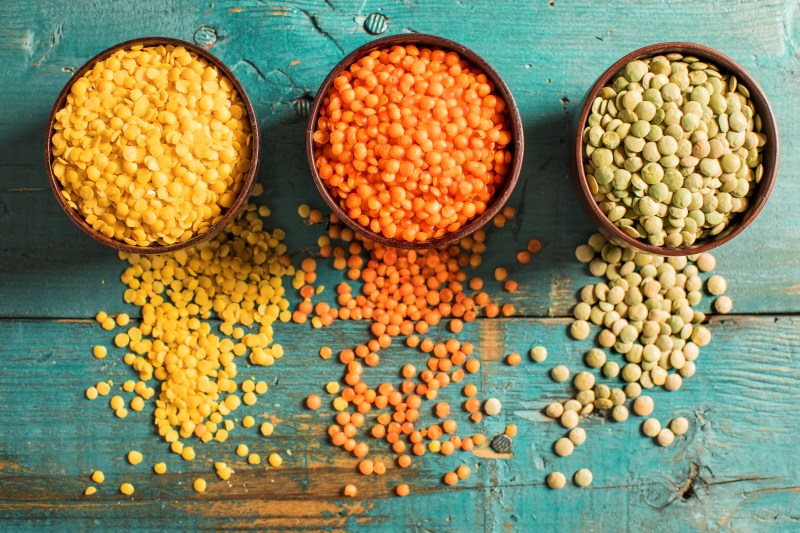Leucine is a nutrient that isn’t talked about nearly as much as those like vitamin C and magnesium, although some experts say it’ll be the “it” supplement of 2025. It has many important functions in the body. As a trainer, I am sure to make my clients aware of the foods high in leucine, as it helps with simulating muscle growth and repair, among other things.
Keep reading to learn more about how leucine can benefit your body and what 11 foods are highest in the nutrient!
What is leucine?

Leucine is an essential branched-chain amino acid (BCAA) that plays a crucial role in protein synthesis and muscle repair. While the body does not naturally produce it, you can meet your daily requirements through food sources like meat, dairy, soy, and legumes.
Because of how leucine influences factors like muscle growth and metabolism, it is especially important for athletes, bodybuilders, and those recovering from injuries. In addition to its role in muscle health, leucine also supports overall metabolism, immune function, and blood sugar regulation.
What are the benefits of leucine?

Stimulates muscle growth and repair
Leucine is needed to stimulate muscle protein synthesis, which promotes muscle growth and recovery after physical activities. According to an NIH study, “Leucine and essential amino acids appear to stimulate human muscle protein synthesis primarily by activating the mTOR signaling pathway.” If you are an athlete or consistently in the gym, this goes to show how it could support your progress.
Improves metabolism
Leucine helps regulate blood sugar levels and insulin sensitivity, supporting a healthy metabolism. It can also enhance fat loss by preserving lean muscle tissue, contributing to a more efficient metabolic rate.
Supports immune function
A healthy immune system is something everyone can benefit from, and leucine plays a role. By helping produce antibodies and other immune cells, the nutrient can aid the body in defending against infections and illness.
11 foods high in leucine

- Chicken breast: Chicken breast provides about 2.6 grams of leucine per 100 grams. It’s an excellent source of high-quality protein, supporting muscle repair and growth.
- Eggs: One large egg contains approximately 0.5 grams of leucine. Eggs are rich in protein and essential amino acids, making them a perfect addition to any muscle-building diet.
- Tuna: A 100-gram serving of tuna provides about 1.7 grams of leucine. Tuna is a lean source of protein that helps promote muscle recovery.
- Soybeans: One cup of cooked soybeans contains 2.8 grams of leucine. They are a plant-based source of leucine, ideal for vegetarians and vegans.
- Whey protein: A typical serving of whey protein powder offers about 2.5–3 grams of leucine. It’s a convenient supplement for promoting muscle growth and recovery.
- Beef: A 100-gram serving of beef provides about 2.1 grams of leucine. Rich in protein, it supports muscle strength and repair.
- Greek yogurt: One cup of Greek yogurt has around 1.3 grams of leucine. It’s a great dairy option packed with protein and probiotics for digestive health.
- Lentils: A cup of cooked lentils offers about 1.3 grams of leucine. They’re a great plant-based protein source for muscle repair and overall nutrition.
- Peanuts: One ounce of peanuts contains around 0.6 grams of leucine. They are a snackable, nutrient-dense option rich in healthy fats and protein.
- Cottage cheese: One cup of cottage cheese contains about 1.5 grams of leucine. It’s a high-protein dairy product that helps support muscle recovery after exercise.
- Pumpkin seeds: One ounce of pumpkin seeds provides about 0.5 grams of leucine. They’re a nutrient-packed snack, offering protein and healthy fats for overall wellness.
What are the signs of a leucine deficiency?

Leucine deficiency can lead to several health issues, especially related to muscle and metabolic function. Common signs include the following:
- Muscle weakness
- Fatigue
- Reduced endurance
- Impaired immune function
- Susceptibility to infections
- Struggles with appetite regulation
- Difficulty maintaining healthy blood sugar levels
When to supplement leucine

Leucine supplementation may be beneficial in certain situations, particularly for anyone who has higher protein needs or those who have difficulty meeting these needs through diet alone. Athletes, bodybuilders, and people undergoing intense training or recovering from injuries may benefit from extra leucine to support muscle protein synthesis and enhance recovery.
Apart from athletes, vegetarians or vegans are a group who may have lower leucine intake due to only consuming plant-based sources, and they might consider supplementation to ensure adequate levels. Older adults experiencing muscle loss due to aging (sarcopenia) may also benefit from leucine supplementation to preserve muscle mass.
If you believe you fall into any of these groups or you simply want to feel confident you are hitting your daily leucine targets, consult with a healthcare provider to see if supplementation is a good choice for you.
Frequently asked questions

What food has the most leucine?
Chicken breast contains the most leucine, with approximately 2.6 grams per 100 grams. Leucine is an essential amino acid crucial for muscle growth and repair, making chicken a top choice for athletes and fitness enthusiasts. Other high-leucine foods include eggs, tuna, soybeans, and whey protein, supporting protein synthesis effectively.
How can I get 2.5 grams of leucine?
To get 2.5 grams of leucine, eat about 100 grams of chicken breast or three large eggs. Alternatively, consume a whey protein shake, which typically contains 2.5–3 grams of leucine per serving. Other options include one cup of cooked soybeans or 150 grams of tuna, all excellent sources of leucine.
What plant-based foods are high in leucine?
Plant-based foods high in leucine include soybeans, with about 2.8 grams per cup, and lentils, offering 1.3 grams per cup. Other sources are chickpeas, quinoa, and peanuts, all providing around 1–2 grams per serving. Incorporating these into meals supports muscle growth and recovery for plant-based or vegan diets.




